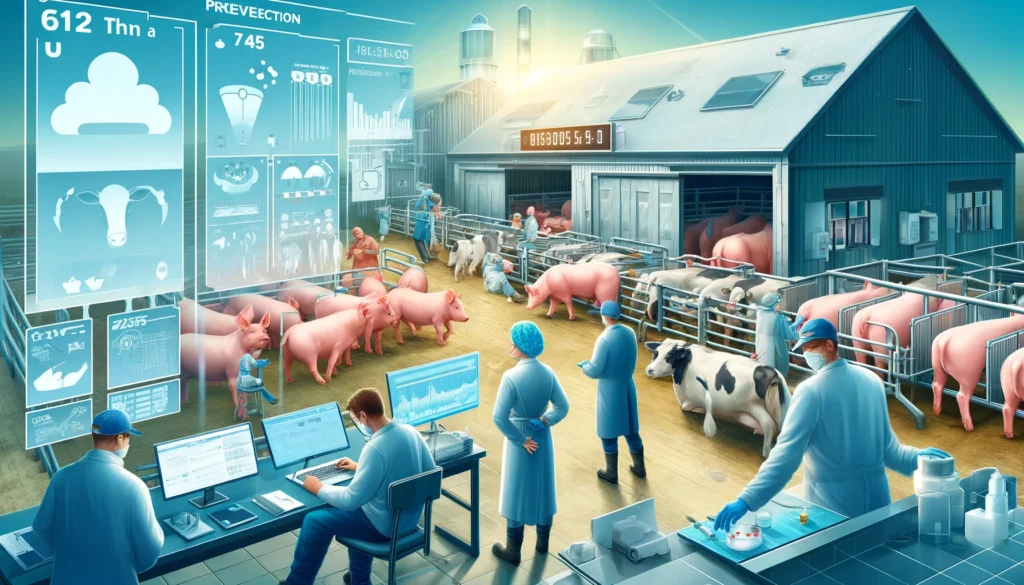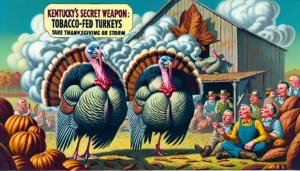
Disease Prevention in Livestock Management A vivid and detailed illustration of disease prevention practices in livestock management. The scene depicts a modern farm with farmers and veterinari 2.webp.webp

Disease Prevention in Livestock Management
Definition:
Disease prevention in livestock management refers to proactive strategies and management practices aimed at minimizing the risk of infectious diseases, reducing disease prevalence, and maintaining herd health and productivity. Disease prevention encompasses a comprehensive approach that includes vaccination programs, biosecurity measures, sanitation protocols, surveillance systems, and herd health management strategies tailored to the specific needs and risks of individual farms or production systems.
Importance of Disease Prevention:
- Health Maintenance: Disease prevention is essential for safeguarding the health and well-being of livestock populations, ensuring optimal growth, reproduction, and performance outcomes. By minimizing disease incidence and severity, prevention measures promote overall herd health and resilience to environmental and management-related stressors.
- Economic Sustainability: Disease prevention contributes to economic sustainability in livestock production by reducing the costs associated with disease treatment, veterinary interventions, and production losses attributable to morbidity, mortality, and reduced productivity. Investing in preventive measures yields long-term returns through enhanced herd health and profitability.
- Public Health and Food Safety: Disease prevention in livestock is critical for protecting public health and food safety by minimizing the transmission of zoonotic pathogens from animals to humans through direct contact, contaminated food products, or environmental sources. Preventing disease outbreaks in livestock populations reduces the risk of human exposure to infectious agents and ensures the safety and integrity of the food supply.
Strategies for Disease Prevention:
- Vaccination Programs: Vaccination is a cornerstone of disease prevention in livestock management, providing effective protection against a wide range of infectious diseases. Vaccination programs are tailored to the specific disease risks and production goals of individual farms, incorporating appropriate vaccines, timing, and administration protocols to induce and maintain immunity in the animal population.
- Biosecurity Measures: Biosecurity practices aim to prevent the introduction and spread of infectious diseases within and between livestock populations. These measures include controlling access to facilities, implementing quarantine protocols for new arrivals, practicing good hygiene and sanitation, disinfecting equipment and vehicles, and limiting contact with wild or potentially infected animals.
- Herd Health Management: Comprehensive herd health management programs involve regular monitoring, surveillance, and evaluation of animal health status to identify and address potential disease risks. Veterinarians collaborate with producers to develop customized health protocols, implement preventive measures, and conduct diagnostic testing to detect and control diseases early.
- Nutritional Support: Proper nutrition plays a vital role in supporting immune function and disease resistance in livestock. Balanced diets, supplemented with essential nutrients, vitamins, and minerals, help maintain optimal health and resilience to infectious agents. Nutritionally compromised animals are more susceptible to disease and less able to mount an effective immune response.
- Parasite Control: Parasitic infections pose significant health risks to livestock and can impair growth, reproduction, and productivity. Implementing parasite control measures, such as strategic deworming, pasture management, and rotational grazing, helps reduce parasite burdens, minimize pasture contamination, and improve overall herd health and performance.
- Genetic Selection: Genetic selection for disease resistance, resilience, and desirable production traits is an important component of disease prevention strategies in livestock breeding programs. Breeding for traits associated with disease resistance, such as immune responsiveness, disease tolerance, and genetic diversity, enhances the overall health and resilience of animal populations.
Implementation and Compliance:
- Education and Training: Livestock producers and farm personnel should receive education and training on disease prevention principles, biosecurity protocols, and best management practices. Training programs help increase awareness, promote compliance, and empower individuals to implement effective disease prevention measures in daily farm operations.
- Monitoring and Surveillance: Regular monitoring and surveillance of animal health status, disease prevalence, and environmental conditions are essential for early detection of disease risks and timely intervention. Surveillance systems may include clinical observation, diagnostic testing, laboratory analysis, and collaboration with veterinary professionals to interpret findings and implement appropriate control measures.
- Compliance with Regulations: Livestock producers are required to comply with regulatory requirements related to disease prevention, biosecurity, and animal health management. Regulatory agencies establish and enforce standards for disease control, vaccination protocols, quarantine procedures, and reporting obligations to protect public health, animal welfare, and food safety.
Conclusion:
Disease prevention is a fundamental aspect of livestock management that requires proactive strategies, interdisciplinary collaboration, and ongoing commitment to maintaining herd health and productivity. By implementing comprehensive disease prevention programs, incorporating vaccination, biosecurity, herd health management, and nutritional support measures, livestock producers can minimize disease risks, optimize production outcomes, and contribute to the sustainability and resilience of their operations amidst evolving disease challenges and production demands.
Fall off the barn roof and busted your keister? Life on the farm or ranch can be tough on the bum. Need a break? Laugh it off at FarmerCowboy.com, the #1 farm humor site. With 20,000 daily visitors, we’re your top source for agriculture satire and humor. Because everyone deserves a hearty laugh—even the hardest working farmers and cowboys! Join us and turn those long days into fun tales at FarmerCowboy.com.

Originally posted 2006-01-27 13:27:47.
Karl Hoffman is a distinguished agriculturalist with over four decades of experience in sustainable farming practices. He holds a Ph.D. in Agronomy from Cornell University and has made significant contributions as a professor at Iowa State University. Hoffman’s groundbreaking research on integrated pest management and soil health has revolutionized modern agriculture. As a respected farm journalist, his column “Field Notes with Karl Hoffman” and his blog “The Modern Farmer” provide insightful, practical advice to a global audience. Hoffman’s work with the USDA and the United Nations FAO has enhanced food security worldwide. His awards include the USDA’s Distinguished Service Award and the World Food Prize, reflecting his profound impact on agriculture and sustainability.





Elon Musk vs. Asmongold — Commuting in a Tesla isn’t just about the destination—it’s about the game on the way.
Farm Radio just played my request! You guys always know how to make a farmer’s day!